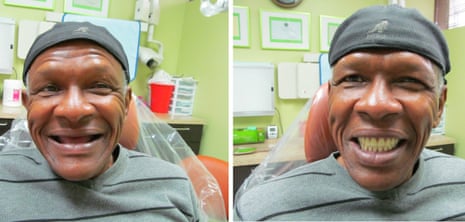For Jon Brennan, all it really took was a mouth full of teeth.
His life fell apart when he was 32. He was running a successful carpentry business, but alcohol and drugs had crept into his life, then slowly taken over. One day he came home to find his house empty. His wife, with whom he was raising two children, had packed her bags and left with the children. She left a note saying: “This isn’t what I signed up for.”

“That just devastated me,” says Brennan, now 59. For the next 10 years, he drowned his sadness in even more drugs, spending his savings and losing his business along the way.
A harrowing trip to the emergency department finally jolted him awake and he cleaned up. He was left with just one persistent problem from his chaos days. His drug use had taken a heavy toll on his mouth: his teeth were a mess.
A counsellor introduced Brennan to Dr Jay Grossman, a dentist and the director of Homeless Not Toothless, a Los Angeles charity that provides free dental care to the homeless, as well as to veterans, foster youth and other at-risk groups.
“My teeth were so bad, he decided to just get rid of the uppers,” says Brennan. “He went ahead and gave me a set of dentures.”
It is a service that is not available to many in the homeless community, but good dental care – and specifically dentures – can transform a homeless person’s life, Grossman said by phone from his office in Brentwood.
Providing people with false teeth can put them out of pain, prevent infection, and restore their sense of pride. And while dentistry in general can be expensive, a set of dentures is relatively affordable, and can last for a decade or longer.
Quick GuideWhat is the Upside?
Show
Ever wondered why you feel so gloomy about the world - even at a time when humanity has never been this healthy and prosperous? Could it be because news is almost always grim, focusing on confrontation, disaster, antagonism and blame?
This series is an antidote, an attempt to show that there is plenty of hope, as our journalists scour the planet looking for pioneers, trailblazers, best practice, unsung heroes, ideas that work, ideas that might and innovations whose time might have come.
Readers can recommend other projects, people and progress that we should report on by contacting us at theupside@theguardian.com
“I don’t want to take away from the importance of food, shelter and proper medical care,” says Grossman, who has been running Homeless Not Toothless since he founded the charity in 1992. “But even if we provided all that, and they have no teeth – so aesthetically they don’t look the part – what kind of job are they ever going to get?”
Brennan noticed the difference immediately. With his dentures, he was finally able to eat properly, which improved his health. His pain was gone and he regained his confidence.
“I could get out working again and not be embarrassed by my teeth,” he says. “A first impression is a first impression. We all say, ‘Well, I don’t judge people’, but everybody does.”
The need for dental services in the homeless community is enormous, says Grossman, noting that Homeless Not Toothless has a waiting list of 900 people. A handful of other charities are trying to meet the demand in other parts of the world: an Irish dental technician fits homeless people for dentures on the streets of Dublin.
In Houston, Healthcare for the Homeless offered dentures or other dental care to more than 6,700 people last year.
And in Geneva later this month, the homeless charity Carrefour-Rue will begin offering free dentures to the homeless people who come to its weekly dental clinic.
Its first patient, a man in his 30s, has lost all but six of his teeth. This week, a volunteer dentist will fit him out for a set of dentures in a small room at one end of the container-cum-health centre on the edge of Geneva’s Parc Beaulieu. Three weeks later, the prosthesis – which could last for a decade or longer, if the man takes good care of it – will be ready to wear.
“I think he has no idea what he’s getting, but I’m certain it’s going to completely change his life,” says Dr Edoard Coquoz, a volunteer dentist who oversees Carrefour Rue’s dental services.
Coquoz has already identified two dozen other candidates for the service. But he is sure the need is much greater.
“Our goal is to help people re-establish their lives, bit by bit,” says Noël Constant, a ponytailed 79-year-old who is Carrefour-Rue’s director.
“It’s a question of being able to chew, but also of appearance,” he adds. “Our society is very intolerant. It puts a huge importance on the way you look.”
This article is part of a series on possible solutions to some of the world’s most stubborn problems. What else should we cover? Email us at theupside@theguardian.com
